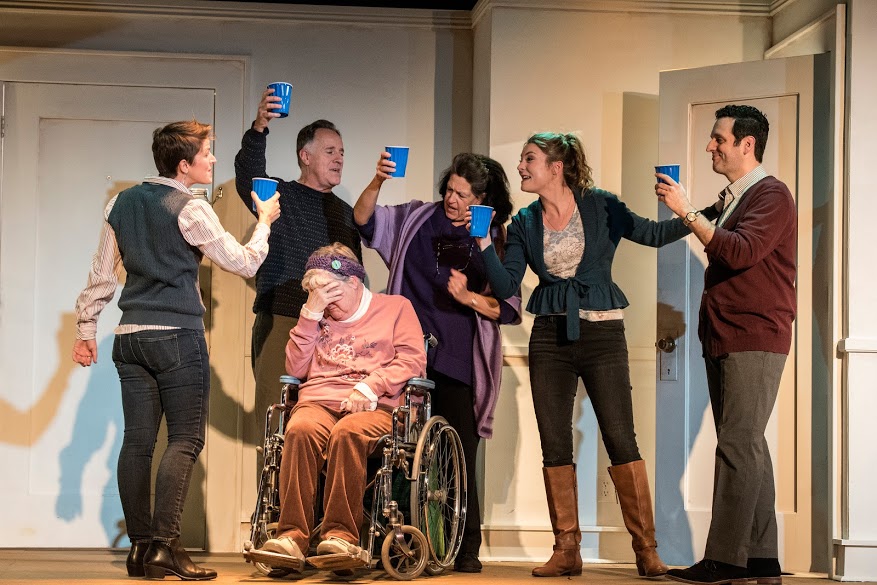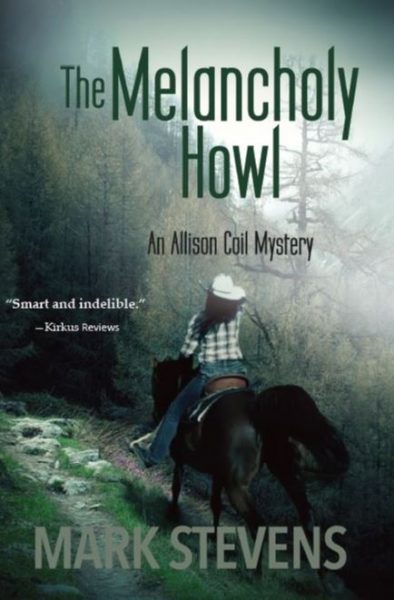
11 Nov Tall Tales/TIO Denver: “The Humans” at Curious Theatre Company
“The Humans” by Stephen Karam, which received the 2016 Tony Award for Best Play, is now up at Denver’s Curious Theatre Company. The run is through December 22. Our Denver theater critic, award-winning author Mark Stevens, reviews the production. Tickets here.

Left to right:: Susannah McLeod as Aimee, Kevin Hart as Erik, Anne F. Butler as Deirdre, Anastasia Davidson as Brigid, and Antonio Amadeo as Richard with Kathryn Gray (as Momo) in the wheelchair. Courtesy, Curious Theatre Company.
Until the rifts reveal themselves and the secrets bubble to the surface in Stephen Karam’s “The Humans,” we are introduced to the Blake family in sublime, organic fashion.
Presented by the Curious Theatre Company on a massive two-story stage that brings us smack into the lower Manhattan apartment of Bridget Blake and her boyfriend Richard, “The Humans” is two-hours of eavesdropping. The dialogue flies but it doesn’t feel, well, like dialogue. It doesn’t sound like anything composed. (“The Humans” was a finalist for the 2016 Pulitzer Prize for Drama and won the 2016 Tony Award for Best Play.)
Karam’s ear for natural conversation is uncanny. The team of actors in this ensemble, sharply directed by Dee Covington, brings the script to life with restraint. Not a moment feels forced. The play runs not quite two hours, but there is no intermission. You get the feeling that Karam is saying real life does not take intermissions. The play invests so heavily in its long fuse than when the fireworks finally come, they mean business.
The result is a powerful production that ponders how we all manage to go along and get along, despite the strange noises, strange dreams, and very real forces that are threatening to tear apart both the big world out there and this one specific family in here gathering for a Thanksgiving meal and all its related rituals and routines.
The split-level apartment is connected by a spiral staircase. Action throughout the play is often simultaneous upstairs and downstairs, Karam drawing our eyes away long enough to be surprised by some drama downstairs (or vice versa). Each level can be accessed via the building elevator. This is the only way that Foina “Momo” Blake can make the trek from her upstairs arrival to the downstairs dinner table since she’s in a wheelchair. Momo has dementia. Her presence is powerful, even though her lines are few.

“The Humans,” courtesy, Curious Theatre Company
The lower apartment is empty, for the most part, except for a round table and metal folding chairs. Brigid Blake has just moved into this dingy white space with her boyfriend Richard. Their furniture is still in transit. The setting is makeshift and Brigid hears plenty of commentary about the lack of natural light and the location of the bathroom (upstairs) when the family arrives. Brigid’s father Erik, mother Deirdre, and the aforementioned Momo have made the trek from Scranton and Brigid’s sister Aimee arrives from Philadelphia where she works as a lawyer.
Momo’s issues are obvious. Everyone else’s issues will come to light all in good time. They are manifold. Money. Work. Love. Health. Religion. Generational clashes. Affairs. And, yes, 9-11. Sound familiar? Sure. A big middle class Irish family meeting for a Big Holiday and starting to pour wine and crack beers from the minute they walk in the door? We know that buttons will be pressed. We know emotions will erupt. (They do.)
But Karam leads with heart. The heat can wait. Brigid is earnest and she works hard to keep the gathering light and upbeat. Erik seems more bemused about the cards he’s been dealt. He’s keenly aware he’s made some mistakes, but he soldiers on in the face of his own increasing fears and growing sense of trepidation about what lies ahead. Deirdre questions Brigid’s lack of interest in formal marriage, but most of the pressure on The Blakes is the big squeeze on the middle class, the vanishing horizon of retirement in the case of Deirdre and Erik and the apparent challenge ahead for Richard and Brigid to forge a life given Brigid’s job prospects. We get the feeling the dingy apartment with the noisy neighbors and busted light bulbs won’t be providing much in the way of a peaceful sanctuary for a long time to come. And the whole family is supportive of Aimee, who is battling both intestinal issues and major heartbreak after being dumped by a longtime girlfriend. Karam piles woe on top of woe. Alas, it feels like genuine reporting on the quality and strains of life and not as a dramatic trick. Big issues out there, like 9-11 and Hurricane Sandy, are referred to in only vague terms—but they are acknowledged as yet more stresses that buffet everyday lives. Sometimes, it’s good to be prepared. Others, it’s good to have luck. Karam slips these morsels into the meal with such ease that we barely notice.
The six actors at Curious are stellar. At times, the script calls for multiple conversations. (Just like a real family gathering.) The script also calls for exquisite timing and this group is tight. The play seems to be deciding whether it’s more about Brigid or more about Erik, but also gives everyone at least a few key moments, even Momo when the time comes (and it’s a ferocious bit). Trying to itemize strengths among the individual cast seems unnecessary; Covington has nurtured a team here that clicks like family. The cast is Antonio Amadeo (Richard), Anne F. Butler (Deirdre), Anastasia Davidson (Brigid), Kathryn Gray (Momo), Kevin Hart (Erik), and Susannah McLeod (Aimee). For the most part all six are on stage the entire show and they should share the credit equally along with Covington and the powerful set by Markas Henry.
More about Mark Stevens:

Mark Stevens, courtesy Cyrus McCrimmon
Telluride Inside… and Out’s monthly (more or less) column, Tall Tales, is so named because contributor Mark Stevens is one long drink of water. He is also long on talent.
Mark Stevens was raised in Massachusetts, but he’s been a Coloradoan since 1980.
Mark has worked as a print reporter, ((Denver Post, Christian Science Monitor, Rocky Mountain News), national news television producer, (MacNeil/Lehrer NewsHour) and school district communicator. He’s now laboring in the new economy, listed under “s” for self-employed public relations exec.
Mark has published four Colorado-based mysteries, “Antler Dust”(2007), “Buried by the Roan” (2011), “Trapline” (2014) and “Lake of Fire” (2015). “Trapline” won the Colorado Book Award. The fifth book, “The Melancholy Howl,” is out now and has received universal raves.
“The author masterfully illustrates many of the complex issues around legalized marijuana and the gray swamp between legal and illegal, inhabited by productive beavers and deadly water moccasins alike. From beginning to end, ‘The Melancholy Howl ‘is a well-written, riveting, gotta-see-what-happens-next read. So, whether this is your first Mark Stevens novel or your fifth, it most certainly won’t be your last,” wrote the Colorado Book Review.

For more about Mark, check out his website.


Sorry, the comment form is closed at this time.